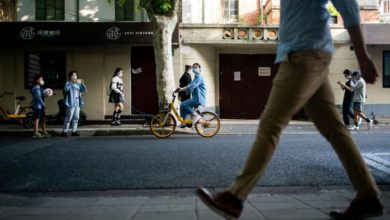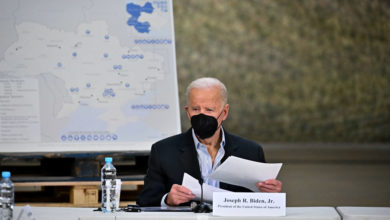Shanghai Workers Clash With Guards in Locked Down Factory

Violent clashes, mounting infections and vacant factory floors: the turmoil that’s engulfed tens of thousands of workers at an Apple Inc. supplier in Shanghai is a troubling symptom of China’s extreme efforts to keep factories humming during its worst Covid outbreak since 2020.
Trapped in a bubble for almost two months, locked down by government decree and walled off from the outside world, Quanta Computer Inc.’s mostly low-wage workers are demanding more freedom and beginning to revolt against their overseers, people familiar with the matter said, asking not to be identified for fear of reprisals.
Guards have faced hundreds of protestors. According to employees, large numbers of workers were worried about running out of supplies if the lockdown continued. They flooded guarded isolation barriers in their search for daily necessities. Over the past weekend, media reports went viral of a large group storming a dormitory housing Quanta’s Taiwanese managers after a dispute over the prolonged lockdown and pay — triggering an hours-long standoff confirmed by several workers within the compound.
The incidents underscore how sentiment is souring on a lockdown that’s up-ended the lives of 25 million Shanghainese since March.
“People are getting frustrated and tired of these controls,” one of the workers said. “That’s inevitable, especially when there is no timeline on when all this will end.”
Learn More Shanghai’s COVID-19 Lockdown Pushes Residents to the Brink
Representatives from Quanta and Apple declined to comment on this story. In April, Quanta said in a filing to the Taiwan exchange that it was halting production at its Shanghai site and adopting measures in compliance with the local government’s regulations to protect its staff.
An uproar at one the largest manufacturers in eastern China has added to the growing tensions between society and the industry about the need for virus controls. The speed with which the situation escalated in Shanghai — home to marquee names from Tesla Inc. to General Motors Co. — is a stark warning to policy makers trying to stamp out infections through unprecedented quarantine measures. Worker unrest risks disrupting a vast manufacturing sector at a time China’s struggling to meet its official 5.5% growth target.
It’s not just laborers. Students from Beijing’s colleges have revolted in recent months; protests have been staged by housing communities; social media users who post critical videos have attempted to outwit an army censors.
Yet the chaos at Quanta exposes a more consequential breakdown in Beijing’s Covid Zero strategy: China’s mandarins have insisted that the world’s No. Even with lockdowns in place at Apple’s MacBook maker, the world’s No. 2 economy can continue to operate despite restrictions. It is more complex than that.

Tourists wait at Hongqiao Railway Station, Shanghai, China, Sunday May 22, 2022.
MING DE/ Feature China/Future Publishing via Getty Images
The economic impact of China’s zero-COVID strategy
It’s unclear how widespread factory unrest is at the moment, but economists say Quanta is unlikely to be an isolated incident. Bloomberg News telephone interview with workers at Shanghai factory asked them for anonymity as they were not allowed to speak publically and fear reprisal.
Most factories in and around Shanghai have gone into “closed loops” since late March, a mechanism hailed by China’s government as the most effective way to contain the spread of Covid while keeping the engines of the economy running. The system forces workers to live and sleep on factory sites — or in nearby accommodations. Now, Quanta’s experience may contain lessons for the other manufacturers operating in similar bubbles, that collectively make much of the world’s smartphones, laptops and computers.
It is growing and real. China’s biggest chipmaker and a major iPhone supplier cut their outlooks for the second quarter. Apple — Quanta’s biggest customer — estimates Covid restrictions in China and other supply constraints will cost the company as much as $8 billion of sales. Even Tencent Holdings Ltd.’s billionaire co-founder Pony Ma shared a viral opinion piece on the economic costs of China’s strict Covid Zero measures.
Learn More Shanghai COVID-19 is separating parents and children
“I don’t think closed loops are sustainable in the medium term as workers will eventually not be able to continue working in this way,” said Alicia Garcia Herrero, chief economist for Asia Pacific at Natixis SA. Closed loop systems can only provide temporary solutions, even though they drive the economy. The social burdens are increasing. “A healthy economy and society is much more than that.”
Quanta’s vast campus in the Shanghai suburb of Songjiang serves as both workplace and temporary home for unskilled migrant workers from across the country — as well as higher-paid engineers from Taiwan. Before the Covid outbreak, blue-collar workers would take shifts to make Apple’s MacBook and other laptops in a factory nearby. According to those who have been there, a standard dormitory can house 12 people stacked on bunk beds.

Officers at a security checkpoint in Shanghai’s Jing’an on May 25, 2022 during the Covid-19 coronavirus lockdown.
HECTOR RETAMAL/AFP via Getty Images
Quanta was forced to close its factories and put workers into their dorms during the April mandatory lockdown. After a management closed loop, production resumed at a reduced level. A worker said that the company still paid their workers their basic salary, which was 3,000 yuan ($450) per month. That’s a fraction of the average wage in China’s richest city. Many people felt that failing to adhere to the law was equivalent to breaking it. “Not complying with Covid measures is a violation of the law. You’d get caught for that,” one of the workers said.
But viruses don’t obey human laws. According to several employees, Covid entered the compound shortly before the lockdown and the cramped living conditions triggered a local epidemic.
Managers moved swiftly, commissioning buses — sometimes dozens at a time — to ferry positive workers to makeshift hospitals. However, as city infections rose rapidly, workers asked for some to remain with infected colleagues until further transport arrangements could be made. Quanta called back employees that had worked at home, and put them in closed loops.
Learn More Taiwan abandons its COVID-Zero Strategy
The number of cases increasing caused it to take longer for the test results to be returned, which led some people frustrated.
“Most of the workers in the factory are those recovered from Covid,” said one of the workers. “The company doesn’t want negative workers to resume work.”
Some of the consequences of the lockdown weren’t easily identifiable. Many workers claimed that the lockdown took its toll on mental and physical health over several weeks. Employees were forced to smoke, play video games and complain about being in a cramped space. They also had little else to do but wait for test results.

An east China citizen walks at Pudong New, Shanghai’s shopping mall, May 20, 2022.
Fang Zhe/Xinhua via Getty Images
The balance between COVID protection and economic growth
China’s financial hub has been slowly easing restrictions as its outbreak ebbs, with hardly any infections found outside of quarantined areas. The majority of residents can now travel outside their homes on a limited basis. However, the closed loops Quanta and other individuals have used seem to be permanent. Officials indicate that they would like to see the system expand to other areas of the economy. The city announced last week that more than 800 financial companies can resume operations on site as long as closed loops continue to be used. Other officials have repeatedly stressed the effectiveness of the model for containing Covid.
Tesla is still isolating thousands of its workers in disused factories and an old military camp to ensure they’re Covid-19 free. A representative for the company in China has said no further updates could be shared as yet regarding the factory’s status.
Meanwhile, the lockdowns continue to ripple through the global economy, with nearly 200 listed companies across the globe citing China’s measures as a drag on earnings this past quarter. According to executives from industries ranging from electronics to semiconductors, shortages in components and disruptions in supply chains are expected to continue through the year.
Closed-loops aren’t practically sustainable said Bruce Pang, head of macro and strategy research at China Renaissance Securities Hong Kong Ltd. He said that they have higher costs, and not all companies can provide long-term food and lodging for their workers.
Learn More China’s and the World’s Implications of a Beijing lockdown
The system also doesn’t help solve logistics issues, such as deliveries of raw materials and finished products, which is one of the biggest problems businesses in locked down cities are facing.
“China’s policy makers are still facing the trilemma of shoring up growth, achieving the maximum Covid prevention and normalizing social and economic life,” he said.
Many Quanta workers claim they are now resigned that their city is under enforced quarantine. Shanghai allows people to travel, although trains are limited after several routes have been cancelled.
They could end up being confined on campus indefinitely.
“There’s also local lockdown policies on the other end that they’re expected to obey,” said one worker. “They just can’t go back home easily.”
—Rachel Chang provides assistance
Read More From Time





